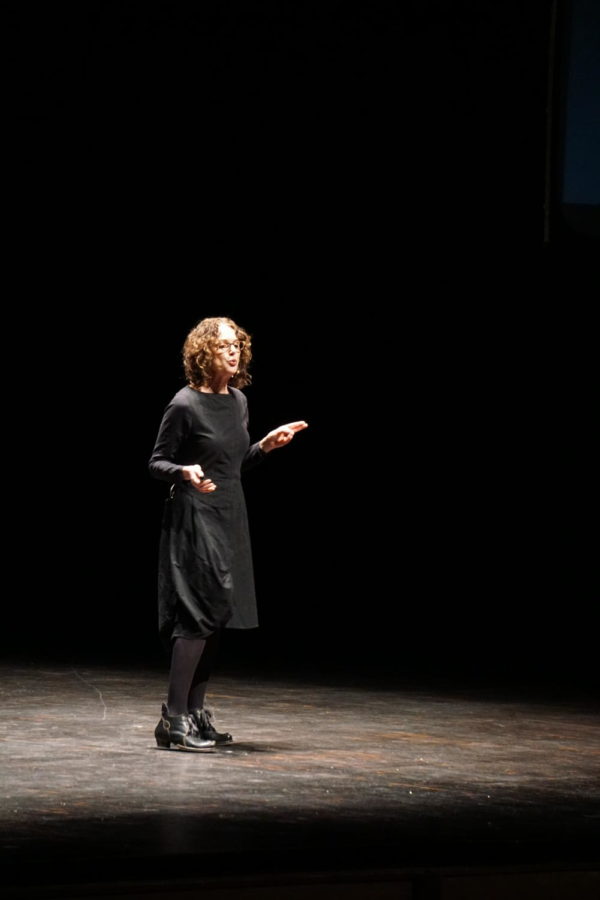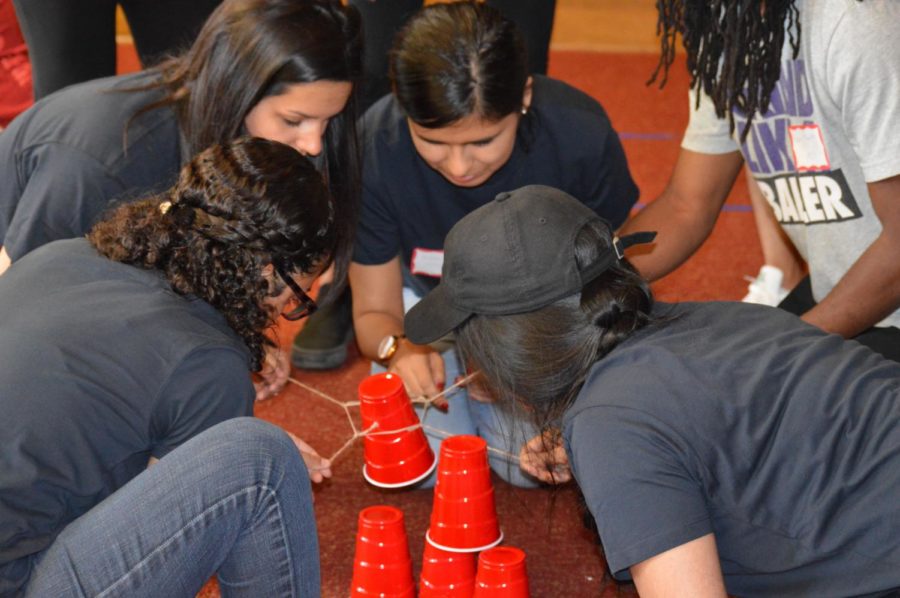Author talks discusses white fragility and conversations about race
Megan Petzold/Iowa State Daily
Robin DiAngelo, who received her PhD in Multicultural Education from the University of Washington and is currently a member of their faculty, came to Iowa State on Feb. 26 to speak to a crowd about her book “White Fragility: Why It’s So Hard for White People to Talk About Racism”. Megan Petzold/ Iowa State Daily
February 26, 2019
Nationally recognized author and lecturer Robin DiAngelo discussed the concept of white fragility Tuesday at Iowa State.
The lecture took place at 7 p.m. in the Stephens Auditorium and was centered around her book, “White Fragility: Why It’s So Hard for White People to Talk About Racism.”
The term white fragility was coined by DiAngelo herself in 2011 as, “a state in which even a minimum amount of racial stress becomes intolerable, triggering a range of defensive moves,” in a paper in the International Journal of Critical Pedagogy.
However, DiAngelo said she was not solely responsible for forwarding the discussion on whiteness and white fragility.
“I also want to acknowledge that a great deal of what I am able to articulate about what it means to be white rests on the years of patient and brilliant mentorship of people of color, those before my time and those in my life now,” DiAngelo said. “People of color have been saying what I am going to say tonight in their own ways for a very, very long time.”
DiAngelo said underlying thoughts and behavior that support white fragility include believing nice people can not be racist, believing, as a white person, one is entitled to comfort and believing they are the judge of racism’s occurrence, among others.
DiAngelo said responses to conversations about race and racism rooted in white fragility are both detrimental and impactful.
“They are incredibly powerful because they marshall behind them the weight of history and institutional power and legal authority,” DiAngelo said.
Discomfort was something she said she hoped white people at her lectures felt, and she encouraged them to embrace it, DiAngelo said.
“We aren’t going to get where we need to go from a place of white comfort,” DiAngelo said. “The key is what you do with those moments, if I manage to stimulate them.”
Not understanding the systemic nature of racism, as well as holding an opinion but not being informed on racism, DiAngelo said, were among common challenges which come up when teaching white people about racism.
Through statements such as “I work in a diverse environment,” or “I was taught to treat everyone the same,” DiAngelo said white people will often try to assert their lack of racism, but these statements are like a dock, and there are underlying structures and biases that continue to limit discussions of racism, which are not seen at the surface level.
DiAngelo said white progressives can also limit discussions of race in this way because when topics of race and racism come up, especially when talking with people of color, white progressives will immediately jump to trying to prove that they lack racism.
DiAngelo said mainstream definitions of racism, such as an individual who consciously is mean to people based on their race, causes white defensiveness when talking about the topic. However, racism is not about a singular instance. It’s about a system.
DiAngelo also said she hoped white people would no longer use the term reverse racism.
“Please remove the term ‘reverse racism’ from your vocabulary,” DiAngelo said. “There’s no such thing. Everybody has biases, so yup they’re just as biased as we are, but when you back my bias with institutional power, it is transformed, and I reserve the term racism to describe that or else we render this meaningless.”
DiAngelo said an antiracist frame is rooted in recognizing that good and bad binary is not relevant, racism is complex and one does not have to understand it for it to be valid and recognizing the implicit and unconscious nature of bias and the distrust of people of color hold with schools and institutions is rational.
Romina Holder, a graduate student in education and one of the people who began the initiative to have DiAngelo speak, said she hopes even those who disagree with DiAngelo’s message take the time to look further into topics relating to white fragility.
“For anybody who thinks that what DiAngelo is saying is bogus or untrue, I would challenge them to do their research and think past what they know and what they’ve been socialized to know and just be able to be open to a different thought,” Holder said.
Freshman in animal science Jade Stevenson said she hopes more white people will acknowledge and be more open to the concept of white fragility and racism.
“There won’t be any change if people don’t realize the reality of racism and actually accept white fragility as it is instead of denying it or being in denial of being racist or not being racist and that it is actually all a system,” Stevenson said.
While DiAngelo did not take any questions during the event, attendees were able to ask questions, reflect and hold discussions in the lower level of the celebrity cafe area.
There was also a book signing event after the lecture, where DiAngelo’s book was available for purchase.
















